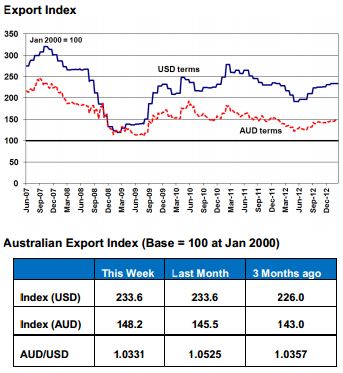



Dairy Australia: Prices Strong as EU Production Dips
GLOBAL - Dairy prices have been performing strongly as EU production decreases, according to Dairy Australia's fortnightly update.GlobalDairyTrade (GDT) prices were up on average for a fifth straight event this week, as the TWI climbed 3.1 per cent, write experts at Dairy Australia.
Every product except MPC70 (down 0.2 per cent to US$6,088/t) got a piece of the action, with WMP posting a 5.8 per cent gain to average US$3,654/t. Forward prices are peaking around the later terms, with July contracts increasing 8 per cent to US$3,734/t.
A gain of 1 per cent overall saw SMP prices average US$3,592/t – contracts for August delivery eased slightly but are still trading nearly $200/t above their March equivalents. This week’s event saw butter sold on GDT for the first time – achieving a healthy US$3,726/t average price in line with other global indicators.
New Zealand milk production finished calendar year 2012 on a strong note – increasing 7 per cent in December.
Production is also up 7 per cent in season-to-date terms, although dry weather through much of calendar 2013 to date is expected to curtail North Island output in subsequent months. Rainfall maps indicate a deficit of at least 20mm relative to average over most of the island.
If significant rain does not arrive soon, farmers may adopt strategies such as once-a-day milking and early dry-off of herds – with the key Waikato production region most likely to be affected.
In the northern hemisphere, November data shows EU-27 milk production continuing to slide – down 1.4 per cent for the month.
Slower production is matching subdued product purchasing activity, preventing a significant build-up of inventory. Over the other side of the Atlantic meanwhile, US data for January shows milk production reached 7.8 billion litres – up 0.5 per cent on January 2012.
The USDA has updated its long term projections to 2022, indicating an expected 15 per cent growth in milk production over the next ten years, despite a steady decline in the national herd size. Percow annual yields are anticipated to average 11,741 litres in 2022, compared to 9,945 litres in 2013.
Dairy Australia’s recently released February Situation and Outlook update provides an Australian and international market wrap, noting the positive signs for global economic recovery coming out of China and the US, as well as concerns relating to the Euro area.
Signs of economic recovery in the US are a plus for consumer confidence and spending, which are increasing slowly (with a flow on effect to export-dependent developing economies).
Global demand has remained steady despite challenging economic conditions and an increase in commodity prices, while on the supply side the US drought is yet to break, and poor weather is slowing EU production growth.
The Australian Front
Murray Goulburn (MG) announced its third step-up of the 2012-13 season: 8c/kg butterfat and 20c/kg protein, for ‘weighted average available price’ of $4.90/kg MS.
Management maintained that efforts in reducing headcount and operating costs had enabled MG to pay the step-up.
Bega Cheese reported half-year results this week, with revenue up 9.6 per cent to $491.3 million and profit from ordinary activities up 13.6 per cent to $15.9 million. In its report to the ASX, Bega highlighted higher margins for value-added products, increased volumes and greater efficiencies in cheese
cutting and packaging as the key profit drivers.
Lion Dairy & Drinks reported revenues down 10 per cent for the 12 months ended September 2012, due to private label contract losses and reduced branded sales. Despite lower revenue, the Dairy & Drink’s business saw its earnings up 9.1 per cent owing to ‘internal cost savings in manufacturing, distribution and back office functions.’
Aldi has announced plans to invest $500 million into establishing distribution centres in South Australia and Western Australia, with a view to supporting a yet-to-beestablished 40-50 stores in South Australia and 60-70 in Western Australia. Aldi is estimated to have 7 per cent share of the total national grocery market and its expansion will further intensify competitive pressure.




